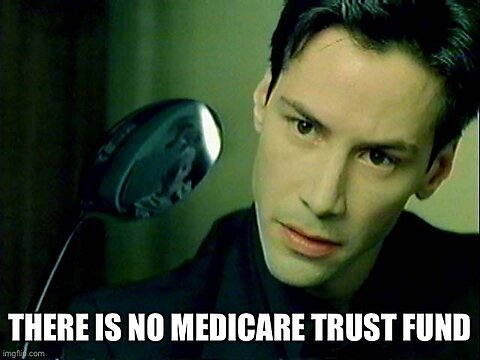
Michael F. Cannon
Everyone says Medicare is facing a “trust fund shortfall.” Not only is that a gross falsehood, the reality is much worse.
The very phrase “Medicare trust fund” is a pure falsehood. There is no such thing. That which the phrase describes contains no funds, nor should one trust anybody who pretends it does.
When people use the words “Medicare trust fund,” they are referring to something that is effectively a “Medicare spending authorization countdown clock.” Congress says Medicare can keep sending hospitals money, without further action from Congress, until (A) total historical Medicare expenditures on hospitals reach the same level as (B) total historical Medicare payroll tax collections. Right now, B is larger, yet A is rising faster. If A (spending) catches B (revenues), Medicare loses some of its authority to send money to hospitals. How much? About 11 percent of it. To restore that 11 percent, Congress could…just provide additional spending authority.
What people call “Medicare’s trust fund balance” is just the difference between A and B. When that “balance” is positive, it means B still exceeds A—i.e., there’s still time on the clock. When people talk about “Medicare’s looming trust fund insolvency,” they mean current trends suggest A will soon catch B—i.e., time is running out. When people talk about “Medicare’s insolvency date,” they mean the date on which officials forecast A will exceed B—i.e., time is up.
If that day arrives, Medicare’s fiscal outlook would improve, because its hospital spending would move just slightly in the direction of spending levels in other advanced nations. It tells us something about the politics of health reform that everyone acts like that’s a bad thing.
Doesn’t the “trust fund” collect payroll tax receipts? Aren’t those real assets? Yes and yes. But Congress immediately takes those real assets out of Medicare’s Part A “trust fund“ and puts them into general revenues. In their place, Congress deposits treasury bills, which, in the hands of the federal government, have zero economic value. They are completely worthless. Yet we call them … “assets.”
Doesn’t Medicare calculate “interest” on the “assets” in its “trust funds”? Yes, which adds a weird twist. However, the short version is that we can basically ignore it. The key to understanding why is, again, that there are no assets in the trust fund. So there is nothing that is earning interest, because there is nothing on which to earn it. All that’s happening is: Congress is directing the trustees to treat the “trust fund balance” as if it did consist of interest-earning assets and to calculate what that interest would be if those were real assets. The only real-world effect of the “accrual“ of “interest“ on the “assets“ in Medicare’s “trust fund“ is that it adds to the “balance“ and therefore delays the date of “insolvency.” Since that “interest” is no more real than any other part of this goofy accounting fiction, and since all it does is marginally delay the date on which the relevant spending authority expires, we can basically ignore it. Explaining it is worthwhile only if someone bothers to ask.
Nor is it worthwhile even to distinguish between the trust funds. (Again, unless someone asks.) While the Part A “trust fund“ is a countdown clock, the Part B “trust fund” is truly meaningless. It has no real-world impact at all. Why acknowledge its existence? It might as well not exist.
Using the phrase “Medicare’s trust fund” for any reason other than exposing its falsehood is grossly misleading. It implies there’s a pot of money available to fund Medicare, when no such pot exists. If Congress wants to solve Medicare’s fiscal challenges, it needs to understand and portray them clearly. That means scrubbing the phrase “Medicare trust fund” from federal law and discourse and replacing it with “Medicare’s spending authorization countdown clock.”
All we need to say is: health spending is the largest category of programmatic federal spending; it is the only such category growing as a share of GDP; the main reason is that spending on Medicare and Medicaid is out of control; Congress is paying for it all with more debt; that can’t go on forever; and when the music stops, there will be devastating cuts to Medicare and Medicaid—because that’s where the money is.







